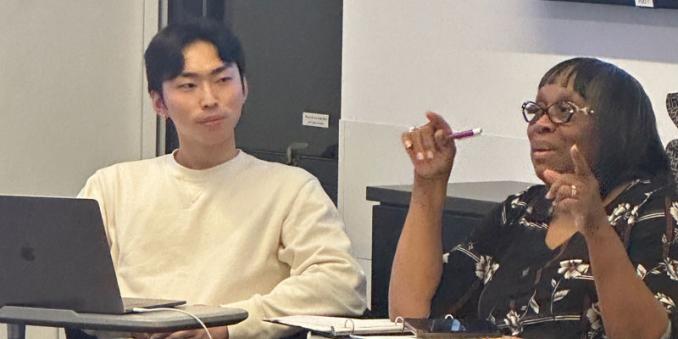For more than a year, Cleveland-area social work and nonprofit management professionals have been expanding their skills and advancing their careers through a unique opportunity at the Mandel School.
The Classroom Without Walls program offers tuition-free access to select graduate-level social work and nonprofit management courses for professionals who live or work in Cleveland—and it’s already proving to be a powerful bridge between the classroom and community.
Participants take courses alongside current master’s students at the Mandel School, engaging in discussions about complex social issues, learning from faculty with deep expertise, and applying what they learn to their everyday practice. The program gives frontline professionals space to reflect, recharge and grow—without the burden of tuition costs.
Launched with the support of the university and the school’s commitment to community engagement, the program aims to strengthen Cleveland’s social services and nonprofit workforce by investing directly in the people doing the work. For many participants, it’s more than professional development—it’s a meaningful step toward continued education, or even a full graduate degree.
"Being in the classroom reinvigorated my passion for the work," shared one participant. "It gave me new tools and new energy to bring back to my organization."
As the Mandel School continues to offer Classroom Without Walls, the benefits ripple outward—to agencies, neighborhoods and the individuals they serve. The program is one example of how higher education can remove barriers, create access and fuel lasting community impact.
Complete this brief interest form
Fall 2025 Course Options
SASS 405: Nonprofit Ethics and Professionalism (3 credits)
Format: On-campus
Date: Tuesdays, August 25 – December 5
Time: 6:30 to 8:30 p.m.
Instructor: Zulma Zabala – President and CEO of East End Neighborhood House; Senior Fellow, Community and Racial Equity at The Center for Community Solutions; grassroots leader; and public speaker regarding neighborhood work, advocacy and collectivism
This course is an application of ethical frameworks and analysis to nonprofit organizations. Using cases and essays the course will help nonprofit managers become better equipped to address ethical problems and dilemmas in their work in the following areas: ethics of boards, ethics and leadership, ethics and organizational culture, professional ethics, and ethics and fundraising.
SASS 428: Nonprofit Board Governance (3 credits)
Format: On-campus
Date: Wednesdays, August 25 – December 5
Time: 4:15 to 6:15 p.m.
Instructor: Janus Small – President of Janus Small Associates
This course explores the definition, history and concept of trusteeship, the areas of responsibilities of Boards of Trustees, the authority of Boards and the limits on their exercise, the organization of Boards and their committees, and the Board's relationships with the Executive Director, the staff and the organization's constituencies.
SASS 500: Operationalizing Antiracism for Everyday Impact (3 credits)
Format: On-campus or online
Date: Tuesdays, August 25 – December 5
Time: 6:30 to 8:30 p.m.
Instructors: Mark L. Joseph – Leona Bevis/Marguerite Haynam Professor in Community Development; founding director of the National Initiative on Mixed-Income Communities; and faculty associate of the Center on Poverty and Community Development & Jennifer A. King – Assistant professor and co-director of the Center on Trauma and Adversity
Gain advanced skill-building experience that equips you with the tools, techniques and practices for effective antiracism. This course approaches antiracism as “a purposeful way of seeing and being in the world in order to transform it” (Lerner, 2021). Be equipped for a career disrupting racism in all its forms and manifestations at the internalized/intrapersonal, interpersonal, institutional and system level. This course focuses on issues of race and racism in the U.S. context, but the antiracist concepts and skills can be applied globally.
SASS 500: Restorative Practices: Ethos and Embodiment (3 credits)
Format: On-campus
Date: Thursdays, August 25 – December 5
Time: 6:30 to 8:30 p.m.
Instructor: Mark Chupp – Associate professor and founding director of the Community Innovation Network
This course offers an in-depth examination of restorative practices rooted in principles of empathy, accountability and community-centered solutions to harm. Restorative justice and restorative practices offer an alternative to traditional Western/settler approaches to crime and wrongdoing. While increasingly popular in Euro-centric societies, restorative practices have their origins in indigenous cultures, wisdom and practices across New Zealand, Africa and North America. This course explores restorative justice theory and practices across diverse contexts and populations. The course is designed to appeal to micro- and macro-focused students, especially to students who seek to blend both.
Please note there is limited space available in these classes.
Classroom Without Walls enrolls three types of students:
- Community learners: Free to those not affiliated with Case Western Reserve
- Alumni: Mandel School alumni pay a reduced rate of $500 per credit hour
- CWRU employees: Can utilize the employee tuition waiver benefit
Those interested should complete this brief form by Sunday, July 20, to be considered for Fall 2025. Faculty will review the information and confirm selections into the program by Friday, August 1.


